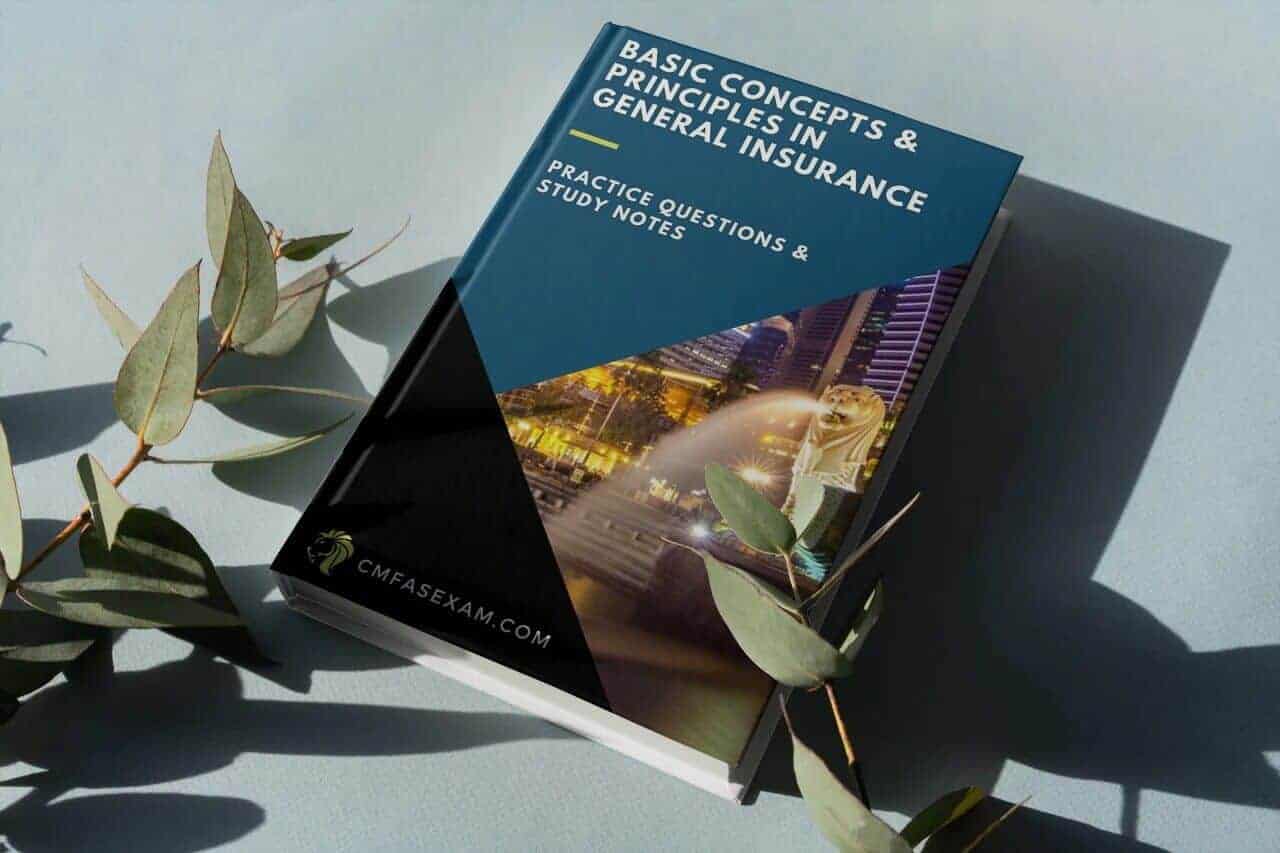SCI BCP (Basic Concepts & Principles In General Insurance) - Basic Concepts & Principles In General Insurance Exam Free Trial Set Two
Let us do all the heavy works so that you can study efficiently.
Quiz-summary
0 of 20 questions completed
Questions:
- 1
- 2
- 3
- 4
- 5
- 6
- 7
- 8
- 9
- 10
- 11
- 12
- 13
- 14
- 15
- 16
- 17
- 18
- 19
- 20
Information
CMFASExam Practice Questions Free Preview
You have already completed the quiz before. Hence you can not start it again.
Quiz is loading…
You must sign in or sign up to start the quiz.
You have to finish following quiz, to start this quiz:
Results
0 of 20 questions answered correctly
Your time:
Time has elapsed
You have reached 0 of 0 points, (0)
Categories
- Not categorized 0%
-
Congratulations! You have completed CMFASExam set two free trial
Get all premium practice questions, key study notes, and bonus tips today!
>> Learn more about our offer <<
Emma Finch
Customer Success Manager | CMFASexam
- 1
- 2
- 3
- 4
- 5
- 6
- 7
- 8
- 9
- 10
- 11
- 12
- 13
- 14
- 15
- 16
- 17
- 18
- 19
- 20
- Answered
- Review
-
Question 1 of 20
1. Question
What is the Minimum Capital Requirement?
Correct
Please Note! the Minimum Capital Requirement is the minimum level of security below which the amount of financial resources should not fall.
Incorrect
Please Note! the Minimum Capital Requirement is the minimum level of security below which the amount of financial resources should not fall.
-
Question 2 of 20
2. Question
What is the role of the Solvency Capital Requirement (SCR)?
Correct
Please Note! The role of the Solvency Capital Requirement (SCR) is to absorb unexpected losses.
Incorrect
Please Note! The role of the Solvency Capital Requirement (SCR) is to absorb unexpected losses.
-
Question 3 of 20
3. Question
What is the definition of Automatic treaty (or obligatory treaty or more simply treaty)?
Correct
Please Note! The automatic treaty is defined as The business/risk reinsured must be ceded by the ceding company in accordance with the contract terms and the reinsurer must accept the business/risk reinsured.
Incorrect
Please Note! The automatic treaty is defined as The business/risk reinsured must be ceded by the ceding company in accordance with the contract terms and the reinsurer must accept the business/risk reinsured.
-
Question 4 of 20
4. Question
Which of the following guides that enable to explain the different clauses found in traditional reinsurance contracts?
I. Law
II. Contract
III. Market practice
IV. Influence on the businessCorrect
Please Note! Trust is the fourth guide that enables to explain the different clauses found in traditional reinsurance contracts.
Incorrect
Please Note! Trust is the fourth guide that enables to explain the different clauses found in traditional reinsurance contracts.
-
Question 5 of 20
5. Question
Which theorem is also often called the capital structure irrelevance principle?
Correct
Please Note! The Modigliani-Miller is also often called the capital structure irrelevance principle
Incorrect
Please Note! The Modigliani-Miller is also often called the capital structure irrelevance principle
-
Question 6 of 20
6. Question
Costs of insurance risk are also called?
I. Opacity costs
II. Frictional costs
III. Liquidity costs
IV. Financial costsCorrect
Please Note! Liquidity cost is not the costs of insurance.
Incorrect
Please Note! Liquidity cost is not the costs of insurance.
-
Question 7 of 20
7. Question
What is covered in Own Risk and Solvency Assessment (OSRA) report?
I. Bank loans and liabilities
II. Role of the Board of Directors
III. Projected future financial position
IV. Objective and nature of the ORSACorrect
Please Note! Bank loans and liabilities is not covered in ORSA report
Incorrect
Please Note! Bank loans and liabilities is not covered in ORSA report
-
Question 8 of 20
8. Question
Which of the following parts Own Risk and Solvency Assessment (OSRA) split?
I. Project-Based ORSA
II. Regular ORSA, on a yearly basis
III. Regular ORSA, on a monthly basis
IV. Five yearly ORSACorrect
Please Note! ORSA can be split into two parts, one is Regular ORSA, on a yearly basis and the other is Project-Based ORSA
Incorrect
Please Note! ORSA can be split into two parts, one is Regular ORSA, on a yearly basis and the other is Project-Based ORSA
-
Question 9 of 20
9. Question
How can financial risks be sorted by their nature?
I. Asset risks: the risks related to insurance company investments.
II. Liability risks: the risks for the company not to be able to assume its commitments due to liquidity shortage.
III. Operational risks: the risks produced by its way for doing business
IV. Man-made risks (terrorism, fire)Correct
Financial risk can be seen in Asset risks (financial risk linked to investment) but also in the liability side (through financial options given to the policyholder, mainly in life insurance).
Incorrect
Financial risk can be seen in Asset risks (financial risk linked to investment) but also in the liability side (through financial options given to the policyholder, mainly in life insurance).
-
Question 10 of 20
10. Question
How can insurance risk be described?
I. Insurance risk is described by their origin
II. Insurance risk is described as their magnitude
III. Insurance risk is described by their volume
IV. Insurance risk is described their nature.Correct
Insurance risk is a threat that is covered by an insurance policy and can cause financial losses. When the insured event takes place and a claim is filed, the insurance company has to pay the policyholder the agreed reimbursement amount. Insurance risks are not generally classified. However, they can be described by their origin, their magnitude, or their nature.
Incorrect
Insurance risk is a threat that is covered by an insurance policy and can cause financial losses. When the insured event takes place and a claim is filed, the insurance company has to pay the policyholder the agreed reimbursement amount. Insurance risks are not generally classified. However, they can be described by their origin, their magnitude, or their nature.
-
Question 11 of 20
11. Question
How can Economic capital be defined?
I. The Risk Measure
II. The horizon of the measure
III. Balance Sheet
IV. Total incomeCorrect
Please Note! Total Income can’t define economic capital.
Incorrect
Please Note! Total Income can’t define economic capital.
-
Question 12 of 20
12. Question
When there is disagreement over the claim settlement, what consumer will do?
Correct
If an insurer settles a claim it pays money to a policyholder for the occurrence of a loss or risk against which they were insured. Insurance companies use the premiums they receive not only to settle claims but also to generate additional income and profit by investing their funds in financial securities. When there is disagreement over the claim settlement, Consumers may file a complaint with the state insurance department
Incorrect
If an insurer settles a claim it pays money to a policyholder for the occurrence of a loss or risk against which they were insured. Insurance companies use the premiums they receive not only to settle claims but also to generate additional income and profit by investing their funds in financial securities. When there is disagreement over the claim settlement, Consumers may file a complaint with the state insurance department
-
Question 13 of 20
13. Question
In social insurance which security actuaries make cost estimates over 75-year projection period and even beyond?
Correct
A person who compiles and analyses statistics and uses them to calculate insurance risks and premiums is known as an actuary. Social security actuaries make cost estimates over 75- year projection period and even beyond.
Incorrect
A person who compiles and analyses statistics and uses them to calculate insurance risks and premiums is known as an actuary. Social security actuaries make cost estimates over 75- year projection period and even beyond.
-
Question 14 of 20
14. Question
In types of the marketing system, which of the following is the definition of Independent Property and Casualty Agents?
Correct
An independent Property and Casualty agent is an insurance agent that sells insurance policies provided by several different insurance companies, rather than a single insurance company. An independent agent receives commissions for the policies that he or she sells and is not considered an employee of a specific insurance company.
Incorrect
An independent Property and Casualty agent is an insurance agent that sells insurance policies provided by several different insurance companies, rather than a single insurance company. An independent agent receives commissions for the policies that he or she sells and is not considered an employee of a specific insurance company.
-
Question 15 of 20
15. Question
In Decision Concerning Payment, which of the following possible three decisions?
I. The claim can be paid
II. The claim can be denied
III. The claim may be paid to Government which may decide how and when to pay the claim and at what terms
IV. The claim may be valid, but there may be a dispute between the insured and insurer over the amount to be paidCorrect
An insurance claim is a formal request by a policyholder to an insurance company for coverage or compensation for a covered loss or policy event. “The claim may be paid to Government which may decide how and when to pay the claim and at what terms” is not included in the three possible decisions.
Incorrect
An insurance claim is a formal request by a policyholder to an insurance company for coverage or compensation for a covered loss or policy event. “The claim may be paid to Government which may decide how and when to pay the claim and at what terms” is not included in the three possible decisions.
-
Question 16 of 20
16. Question
What is Securitization of risk?
Correct
Insurance securitization is a financial technique which consists in transferring insurance risks to investors operating on the international financial markets. This transfer is carried out by gathering these risks and turning them into notes on the capital markets. It means that insurable risk is transferred to the capital markets through the creation of a financial instrument, such as a catastrophe bond, futures contract, options contract, or other financial instruments.
Incorrect
Insurance securitization is a financial technique which consists in transferring insurance risks to investors operating on the international financial markets. This transfer is carried out by gathering these risks and turning them into notes on the capital markets. It means that insurable risk is transferred to the capital markets through the creation of a financial instrument, such as a catastrophe bond, futures contract, options contract, or other financial instruments.
-
Question 17 of 20
17. Question
In types of the marketing system, which of the following is the definition of Career agents?
Correct
Career agents are full-time agents who usually represent one insurer and are paid on a commission basis. These agents are also called affiliated agents because they sell primarily the life insurance products of a single insurer.
Incorrect
Career agents are full-time agents who usually represent one insurer and are paid on a commission basis. These agents are also called affiliated agents because they sell primarily the life insurance products of a single insurer.
-
Question 18 of 20
18. Question
In types of the marketing system, which of the following is the definition of Multiple Line Exclusive Agency System?
Correct
Under Multiple Line Exclusive Agency System, The agents who sell primarily property and casualty insurance also sell individual life and health insurance products. These agents are also called captive agents.
Incorrect
Under Multiple Line Exclusive Agency System, The agents who sell primarily property and casualty insurance also sell individual life and health insurance products. These agents are also called captive agents.
-
Question 19 of 20
19. Question
The probability of getting ahead from the toss of a perfectly balanced coin is 1/2 because there are two sides, and only one is a head. What is the probability of getting 6 dots by rolling dice is?
Correct
Probability is a numerical description of how likely an event is to occur. The formula for probalitiy is result divided by total no of possible outcomes. So in case of dice, probability of getting 6 dots by rolling dice is 1/6.
Incorrect
Probability is a numerical description of how likely an event is to occur. The formula for probalitiy is result divided by total no of possible outcomes. So in case of dice, probability of getting 6 dots by rolling dice is 1/6.
-
Question 20 of 20
20. Question
Assume that two business owners each own an identical storage building valued at $50,000. Assume there is a 10 per cent chance in any year that each building will be destroyed by peril, and that a loss to either building is an independent event. What is the expected loss to the companies?
Correct
The expected loss is the probability of no loss plus the probability of loss. So in the above example 90 per cent chances of no loss. So the correct answer is Expected loss = 0.90 X $0 + .10 X $50,000 = $5,000
Incorrect
The expected loss is the probability of no loss plus the probability of loss. So in the above example 90 per cent chances of no loss. So the correct answer is Expected loss = 0.90 X $0 + .10 X $50,000 = $5,000
Why CMFASExam
Enormous Exam Bank
Large number of questions to help you memorize all possible exam content
Explanation Provided
Get detailed explanation right after each questions
Support All Devices
Support all tablets and handheld. Study anywhere
Until You Pass Guarantee
We are very confident with our product. Therefore all purchase comes with a success guarantee
Bonus Tips
Get the bonus article of: 17 Secret Tips To Improve CMFAS Study by 39%
Adhere to CMFAS Examination Format
All questions are adhered to the real examination format to simulate the real exam environment
Frequently Updated
Our exam bank is frequently updated by our examination team
Carefully Crafted
Each questions is carefully crafted by our exam specialist and adhere to the real question formats
Instant Access
No delivery time and fee is needed. Access immediately after payment

 Congratulations! You have completed CMFASExam set two free trial
Congratulations! You have completed CMFASExam set two free trial

